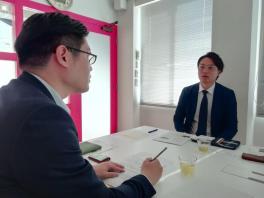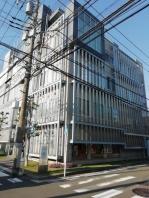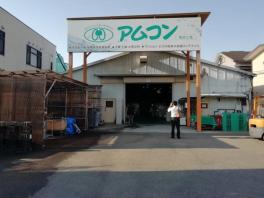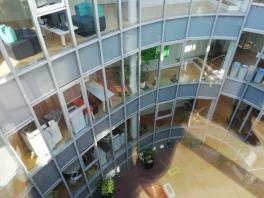- Yokohama-shi Top Page
- Business
- International Exchange and Cooperation
- International Technical Cooperation through Public-Private Partnership (Y-PORT)
- Examples of commercialization
- Spread of sludge dewatering equipment in the Philippines to the public and private sectors (Philippines)
Here's the text.
Spread of sludge dewatering equipment in the Philippines to the public and private sectors (Philippines)
Last Updated May 10, 2024
Current status of environmental pollution caused by sewage from toilets in Cebu, Philippines

Sludge dumping in Cebu City
There is no sewer system in Cebu, Philippines. Sludge discharged from toilets at homes and offices is once stored in a septic tank (decay tank: concrete storage tank that temporarily stores sewage from toilets) installed in the house. Although it may be pulled out once every few years, the rot tank sludge (septaige) drawn by a vacuum car is dumped directly at waste disposal sites without being properly treated. In addition, some houses may flow into the river with rainwater without being sufficiently pulled out, or they may flow directly into the river without a septic tank being maintained in the first place. This has led to major urban problems, such as polluting rivers and groundwater, causing health hazards.

Children playing in the river where sewage flows
In March 2012, Yokohama City signed a memorandum of understanding with Cebu City on technical cooperation for sustainable urban development in Cebu City, and in July of the same year, a small and medium-sized enterprise in the city (Yokohama Water Business Council) A joint survey was conducted with 21 companies, including a member company*), to support the resolution of urban issues in Cebu City.
From January 2014 to January 2016, Amkong implemented the overseas expansion support project “Sludge Dewatering Equipment Spread and Demonstration Project” for the company’s sludge dewatering equipment technology, utilizing local needs information obtained here and the network with the Cebu City authorities.
※Yokohama Water Business Council: As part of the Y-PORT business, a council consisting of Yokohama City, companies, organizations, etc. aiming to revitalize the city economy by solving problems related to the water environment in emerging countries and expanding business opportunities for local companies, etc.
Implementation of dissemination and demonstration projects using Amcon technology

Demonstration Project in Cebu City
In the JICA Promotion and Demonstration Project, Amkong's dewatering equipment has been confirmed to be very effective in the process of treating rot tank sludge pulled out by a vacuum car because it can efficiently separate the rot tank sludge into solids and water, and it is difficult to clogged. Yokohama City also explained to Cebu City officials the system for pulling out from septic tanks in Yokohama City so that the ordinance on sludge treatment will be enforced in Cebu City in this spread and demonstration project, and facilities in Yokohama City We provided technical cooperation to the staff in charge of Cebu City, such as accepting inspections of the operation of facilities. As a result of such activities through public-private partnerships, the company's technology was not limited to Cebu City, but also from the Ministry of Public Works and Roads of the Philippines, other local governments in Japan, and private entities such as food factories. It was an opportunity to introduce it to public sewage treatment plants such as Baguio City and Tal Lak City.
In addition, we have accumulated a track record of delivery to private factories and other facilities in the Philippines, and 21 units have been delivered after the JICA extension and demonstration project.

Figure: Introduction of sludge dewatering equipment
 Installation of dewatering equipment in Baguio City
Installation of dewatering equipment in Baguio City
 Dewatering point of sludge dewatering treatment device
Dewatering point of sludge dewatering treatment device
 Overview of sludge dewatering equipment
Overview of sludge dewatering equipment
 Dewatering point of sludge dewatering treatment device
Dewatering point of sludge dewatering treatment device
 Fluoride discharged from dehydration
Fluoride discharged from dehydration
 Dehydrated cake
Dehydrated cake
Effects and introduction of sludge dewatering equipment
(1) Dissemination of introduction to the public sector (sewage treatment plants, sludge treatment facilities, etc.)
The JICA extension and demonstration project was an opportunity to increase the number of deliveries to sewage treatment plants in the Philippines. In addition to the introduction to pilot plants in Cebu, which was the target city of JICA's extension and demonstration project, the expansion of sewage treatment plants and sludge treatment facilities in Baguio and Tal Lak, and the renewal of equipment and equipment, led to the expansion of the overseas sales channels of the company's products.
In addition, at Baguio City Sewage Treatment Plant, (1) reducing sludge treatment (natural drying) time (drying over about two months and preparing compost for sales can be greatly reduced), and (2) improving hygiene in the workplace (the generation of foul odors and flies is greatly reduced after sludge is brought into the site), and other business effects have been reported.
(2) Introduction and dissemination to the private sector (private facilities in a wide range of fields such as food factories)
These products are being introduced to private factories in a wide range of industries, including local food factories, chemical companies, electronics parts manufacturers, and automobile manufacturers. In the future, attention has been paid to companies that emit a large amount of septage emissions, such as local hotel operators, and are expected to be effective in introducing them, and it is expected that the introduction to the private sector will be further promoted.
(3) Other effects
For the company, the effect of the JICA extension and demonstration project is not limited to the spread effect in the Philippines, but also has spread in various situations.
When I asked Mr. Suzuki of the Amcon Overseas Sales Group about the effects of the JICA project, the results of the JICA project in Cebu seem to have led to interest from Japanese companies. Various media and information posted on the JICA website led to inquiries from Japanese general trading companies. A Japanese general trading company has said that it would like to use the company's equipment as a dewatering device for vehicles in mobile sludge dewatering vehicles proposed to the government of the Philippines.
It was also effective for recruiting. "When we recruited international human resources to strengthen overseas expansion, we had an impact on the company's organizational structure, with two experienced JICA Japan Overseas Cooperation Volunteers who are interested in overseas environmental issues joining the company so far. "
 I spoke to Mr. Amcon Suzuki
I spoke to Mr. Amcon Suzuki
 Amcon Head Office located in Kohoku-ku, Yokohama City
Amcon Head Office located in Kohoku-ku, Yokohama City
 Amcon Yokohama Plant
Amcon Yokohama Plant
 The head office is designed to resemble Amcon products.
The head office is designed to resemble Amcon products.
Inquiries to this page
Global Network Promotion Division, International Affairs Bureau Global Network Promotion Department
Telephone: 045-671-2078
Telephone: 045-671-2078
Fax: 045-664-7145
Email address: ki-global@city.yokohama.lg.jp
Page ID: 972-143-839







